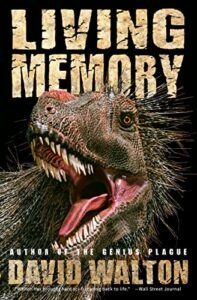
Living Memory
Publication date: October 18, 2022
I’m not usually given to reading action adventure novels. My favorite spectator sport is cricket, and I like long slow meandering walks. In other words, give me cosy mysteries or give me death.
That being said, I do like the occasional foray into the harder genres: SF you can strike sparks off of, westerns redolent with the reek of horses and leather, and even the occasional piece where the characters journey across the world in a desperate race to stop utter disaster. This book sprawls across several genres, never quite settling into the mould of any one of them.
Living Memory started life as a short story. Essentially it posited a brilliant view of a doomed civilization facing extinction at the height of the Cretaceous. The therapod dinosaurs interacted primarily through scent, having built a society and ordered the sum of their knowledge via smell. When the fateful meteor is sighted, a small percentage of this society makes a difficult choice in order to survive the hellscape that the impact will cause.
This central idea has become the basis for a whole novel. It begins in the jungles of Thailand with a group of archaeologists, who are digging up a maniraptoran skeleton. Unfortunately there is an unexpected coup de tat, and they are arrested as spies. The action then shifts to the Cretaceous, 66 million years before.
The society of feathered dinosaurs is described rather well. So is the discovery of the meteor.
The action shifts back and forth between time periods. It adds subplots regarding Thai nationalism, sex trafficking and the horrors thereof, and the evils of warmongering. There’s a lot happening, and I suspect bookstore clerks and librarians will have some difficulty deciding exactly which section this book should be placed in.
Readers who want a neat, by-the-numbers plot may not find this approach appealing. On the other hand, those who are open to a bold mix of big ideas, geopolitics, and dinosaurs that do a lot more than rampage will be rather pleased. The premise is interesting, and the execution is sound. The futuristic elements are believable. The author does characterization rather well, and is as at home in the Cretaceous as he is in modern-day America.
This is a uniquely Walton novel; those who’ve read The Genius Plague in particular will enjoy this latest offering. Those not already familiar with his work should expect stories that exist somewhere in the space between Michael Crichton and Robert J. Sawyer. The novel’s ending is very different from that of the short story that inspired it. The payoff sets up a very intriguing sequel. If you like action with some realism, and a healthy dose of near-future SF, you will certainly enjoy this one.









